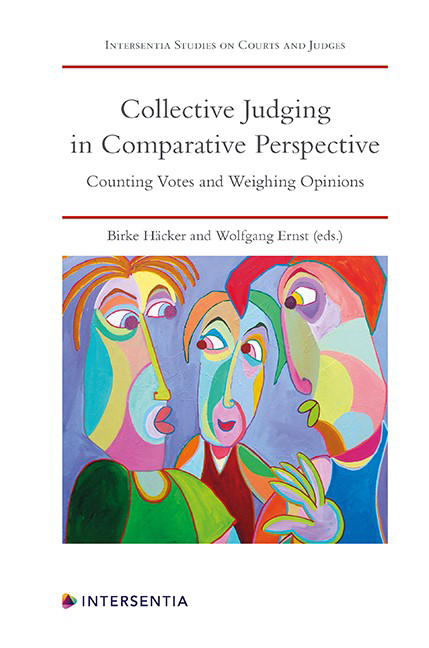Book contents
- Frontmatter
- Preface
- Contents
- List of Cases
- List of Contributors
- PART I DESIGNING COLLEGIATE COURTS’DECISION-MAKING PROCESSES
- PART II COLLEGIATE COURTS IN THE COMMON LAW TRADITION
- PART III COLLEGIATE COURTS IN THE EUROPEAN CIVIL LAW TRADITION
- PART IV COLLEGIATE COURTS IN A NON-EUROPEAN CIVIL LAW JURISDICTION: THE CASE OF JAPAN
- PART V SUPRANATIONAL AND INTERNATIONAL COLLEGIATE COURTS
- PART VI VOICES FROM THE AUDIENCE AND CLOSING REMARKS
- About the Editors
Preface
Published online by Cambridge University Press: 09 February 2021
- Frontmatter
- Preface
- Contents
- List of Cases
- List of Contributors
- PART I DESIGNING COLLEGIATE COURTS’DECISION-MAKING PROCESSES
- PART II COLLEGIATE COURTS IN THE COMMON LAW TRADITION
- PART III COLLEGIATE COURTS IN THE EUROPEAN CIVIL LAW TRADITION
- PART IV COLLEGIATE COURTS IN A NON-EUROPEAN CIVIL LAW JURISDICTION: THE CASE OF JAPAN
- PART V SUPRANATIONAL AND INTERNATIONAL COLLEGIATE COURTS
- PART VI VOICES FROM THE AUDIENCE AND CLOSING REMARKS
- About the Editors
Summary
This collection is the product of a conference entitled ‘Counting Votes and Weighing Opinions – Collective Judging in Comparative Perspective‘, held at All Souls College, Oxford, on 20 and 21 July 2017. The event was co-organised by the editors (both University of Oxford) together with Professor Beate Gsell (Ludwig-Maximilians-Universität München) and Professor Thomas Rüfner (Universität Trier). Our co-organisers regularly sit on cases heard by Higher Regional Courts of Appeal in Germany (Oberlandesgericht München and Koblenz, respectively).
The aim of the conference was to bring together distinguished judges and academics from around the world to discuss the mechanisms, processes and challenges of collective decision-making by judicial bodies. Participants came from a mix of civil law and common law jurisdictions. Judges from national, supranational and international courts reported on their respective practices and experiences, leading to an exchange of views on the pros and cons of various different approaches. Lord Neuberger of Abbotsbury, who was at the time of the conference about to step down as President of the UK Supreme Court, in a closing speech elegantly pulled together all the various red threads that had emerged over two days of intense debate.
Most of contributions contained in this book are updated, amended and in a few cases significantly expanded versions of the papers delivered at the conference. For the purposes of this publication, we have ordered them by the type of jurisdiction they pertain to. The book commences with an ‘impulse paper‘ prepared by Wolfgang Ernst that also initiated the conference itself. The chapters include two (by Professor Gertrude Lübbe-Wolffand by Judge Theodor Meron, co-authored by Christos Ravanides) which would have been given at the conference had not circumstances beyond the speakers‘ control prevented them from attending. Towards the end of the book, we have added a part containing ‘voices from the audience‘. It encompasses contributions by conference attendees who kindly agreed to provide insight into their own experience of collective judging in other bodies, or who offered reflections and comments on the conference topic from an academic perspective. The book concludes with some remarks by the organisers, flagging aspects we found particularly interesting and which we think could inform future ‘court design‘.
- Type
- Chapter
- Information
- Collective Judging in Comparative PerspectiveCounting Votes and Weighing Opinions, pp. v - viPublisher: IntersentiaPrint publication year: 2020

